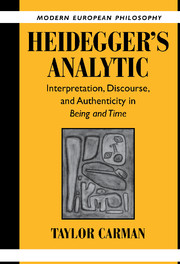5 - Discourse, Expression, Truth
Published online by Cambridge University Press: 19 July 2009
Summary
What if I should ask you what walking is, and you were then to get up and do it?
St. AugustineIn spite of the recent growing interest in Heidegger, there is in the existing secondary literature, with only a few exceptions, surprisingly little sustained discussion of the account of discourse (Rede) in Being and Time. Moreover, when commentators do examine the concept in any detail, they often all too quickly assimilate it to some notion of language or language use, even while acknowledging that Heidegger intended the notion to describe a wider range of phenomena than just words and speech acts. ‘Rede’ is admittedly a common German word meaning speech or talk, and Heidegger does say that the constitutive elements of discourse “first make anything like language possible ontologically” (SZ 163). Both the ordinary meaning of the word and Heidegger's explicit reliance on linguistic examples in his account have therefore led readers to suppose that discourse is no more than a practical prefiguration or anticipation of the structure of fully linguistic artifacts and behaviors. Other interpreters incline in the opposite direction by in effect divorcing the concept of discourse from anything even remotely tied to gesture, expression, or communication. But neither of these two approaches can do justice to all the things Heidegger says about discourse in Being and Time. More importantly, both readings obscure the role discourse plays as a condition of interpretation in the overall argument of the analytic of Dasein.
- Type
- Chapter
- Information
- Heidegger's AnalyticInterpretation, Discourse and Authenticity in Being and Time, pp. 204 - 263Publisher: Cambridge University PressPrint publication year: 2003
- 1
- Cited by



